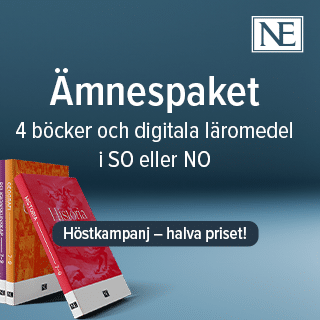Vilket svenskämne? Grundskolans svenskämnen i ett lärarutbildningsperspektiv.
Svenskämnet i de tidiga skolåldrarna fokuserar för mycket på färdigheten på bekostnad av kunskapen, skriver Kerstin Bergöö i sin avhandling. Svenskämnet i skolan har blivit synonymt med att lära sig läsa och skriva – när det borde vara så mycket mer.
Kerstin Bergöö
Professor Frøydis Hertzberg, Universitetet i Oslo
Hej världen!
2005-12-09
VILKET SVENSKÄMNE? Grundskolans svenskämnen i ett lärarutbildningsperspektiv.
Lärarutbildningen
VILKET SVENSKÄMNE? Grundskolans svenskämnen i ett lärarutbildningsperspektiv.
I ”Vilket svenskämne? Grundskolans svenskämnen i ett lärarutbildningsperspektiv” beskrivs hur en grupp blivande 1 till 7-lärare förhåller sig till olika svenskämneskonceptioner genom lärarutbildningen. Avhandlingen har det dubbla syftet att analysera och tolka de studerandes svenskämneskonstruktioner och att institutionsanalytiskt granska utbildningen.
Det empiriska materialet utgörs av lärarutbildningens styrdokument, lärarnas planeringstexter, de texter de studerande skriver i utbildningen samt tre intervjusamtal med varje studerande. Studiens teoretiska ramverk är ämnesdidaktiskt och sociokonstruktivistiskt. Svenskämnets historia diskuteras som en kamp för och emot ett demokratiskt svenskämne.
De studerande är kritiska mot bristen på integration i utbildningen, mellan högskole- och verksamhetsförlagda delar, mellan institutioner och mellan ämnen. I den bild de ger av svenskundervisning i grundskolan framträder svenskämnet som en görakultur där eget arbete i form av faktasökande, färdighetsträning och individuell litteraturläsning dominerar. De studerande talar om det som ett gammalt svenskämne. Det innebär att de studerande inte fått möjlighet att diskutera hur innehållet i elevernas samhandlande kan genereras och analyseras i vad de talar om som ett nytt svenskämne.
Styrkan i svenskkurserna är erfarenhetsutbytet och dialogen kring ämnet och andra lärares undervisning. Svagheten är bristen på kopplingar till de studerandes egna undervisningserfarenheter. Lärarutbildningen tar inte fasta på de studerandes behov av att lära genom att undervisa och diskutera sin egen undervisning. Det i sin tur hänger samman med handledarnas perifera roll i utbildningen.
Avslutningsvis diskuteras ett möjligt svenskämne för grundskolans tidiga år som överskrider synen på språkförmåga som grundläggande färdigheter och där språkut-veckling och skolans demokrati- och kunskapsuppdrag hålls samman.
Abstract in English
Which Swedish? Swedish as a school subject, from the perspective of teacher training describes how a group of future teachers of years 1 to 7 of the compulsory school relates to various concepts of the subject Swedish through three courses delivered at the School of Education. The study has the aim of analyzing the students’ construction of the subject of Swedish as taught in school, and to analyse teacher education in Swedish from an institutional point of view. The empirical material is made up of policy documents applicable to teacher education, planning documents written by teachers and texts written by students in the course of their studies, as well as three interviews with each student. The theoretical framework is didactic and socio-constructivist. The history of the subject Swedish is dicussed as a struggle for and against a democratic mother tongue education.
The students are critical of the lack of integration, between the theoretical and practical elements of the university education, and between faculties and subjects. In the practical work they miss dialogue around the content of the teaching and long-term planning. The picture they give of teaching based on activities, individual factual research and the reading of literature as individual experiences and skills training – they speak of it as ”an old Swedish subject” – means that they have lost the possibility of discussing how the content of a common project can be generated and analysed in their construction of what they call ”a new Swedish subject”. The strength of the Swedish courses lies in exchange of experience and dialogue around the elements of subject theory and analysis of other teachers’ teaching. Its weakness lies in the lack of connection to the students’ own teaching experiences. The work done at the school of education has neglected the students’ need to learn by teaching and discussion of that teaching. This in turn is consistent with the fact that the school of education’s cooperation with teachers at schools has hardly begun.
The thesis finally discusses a possible mother tongue subject for early school years which transcends the view of language ability as a skill, a Swedish subject where language development and the school’s dual tasks of promotion of democracy and knowledge are held together.
Relaterade länkar

Modersmål
 Åk F–9
Åk F–9 Flickor med autism och adhd i skolan
 Åk F–Gy
Åk F–Gy 






